最新人教版八年级英语下册第三单元教案
- 格式:doc
- 大小:82.00 KB
- 文档页数:15
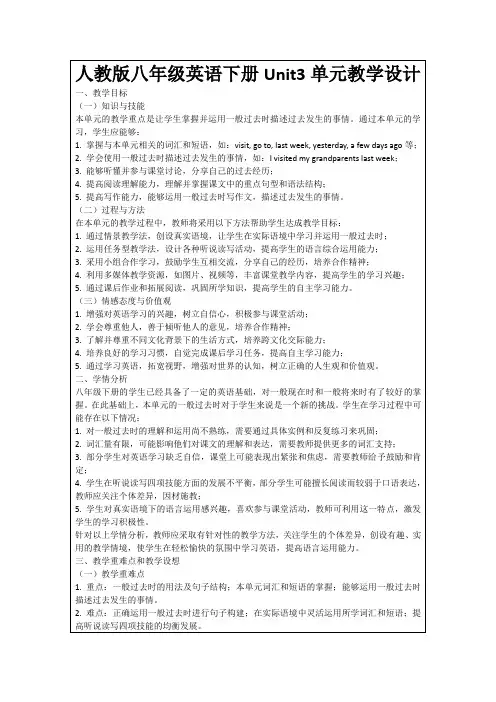
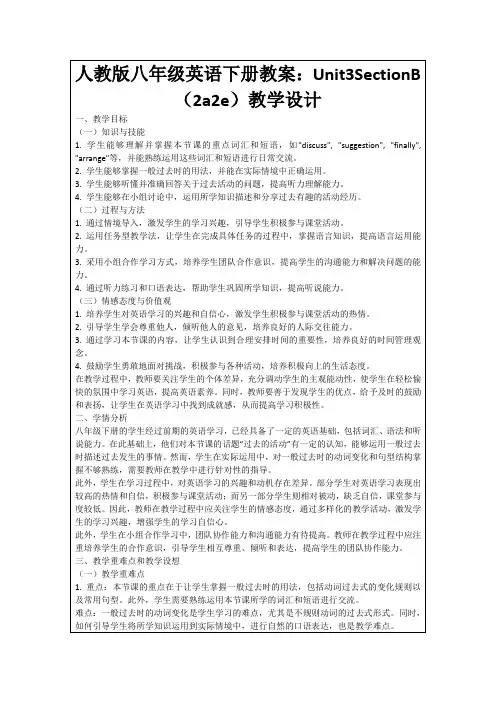
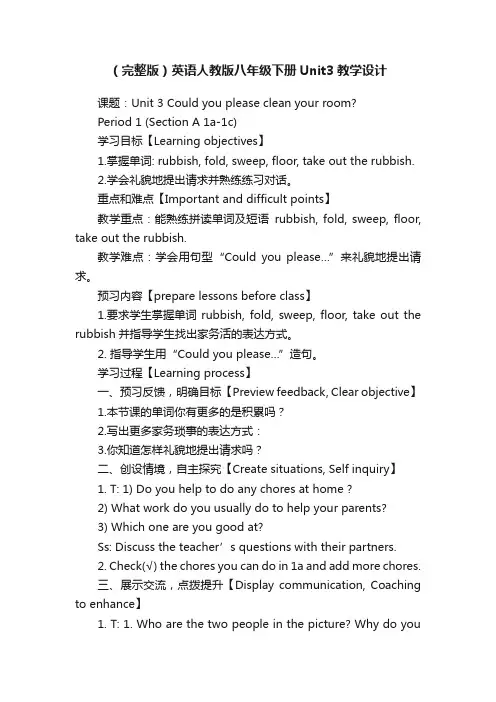
(完整版)英语人教版八年级下册Unit3教学设计课题:Unit 3 Could you please clean your room?Period 1 (Section A 1a-1c)学习目标【Learning objectives】1.掌握单词: rubbish, fold, sweep, floor, take out the rubbish.2.学会礼貌地提出请求并熟练练习对话。
重点和难点【Important and difficult points】教学重点:能熟练拼读单词及短语rubbish, fold, sweep, floor, take out the rubbish.教学难点:学会用句型“Could you please…”来礼貌地提出请求。
预习内容【prepare lessons before class】1.要求学生掌握单词rubbish, fold, sweep, floor, take out the rubbish并指导学生找出家务活的表达方式。
2. 指导学生用“Could you please…”造句。
学习过程【Learning process】一、预习反馈,明确目标【Preview feedback, Clear objective】1.本节课的单词你有更多的是积累吗?2.写出更多家务琐事的表达方式:3.你知道怎样礼貌地提出请求吗?二、创设情境,自主探究【Create situations, Self inquiry】1. T: 1) Do you help to do any chores at home ?2) What work do you usually do to help your parents?3) Which one are you good at?Ss: Discuss the teacher’s questions with their partners.2. Check(√) the chores you can do in 1a and add more chores.三、展示交流,点拨提升【Display communication, Coaching to enhance】1. T: 1. Who are the two people in the picture? Why do yousay so?2. Where are they? How do you know?2. Read the chores and add more chores.3. Use “Could you please…” to make a conversation just like Peter and his mother. 1c.4. Listen to 1b and check their answers.四、师生互动,拓展延伸【Teacher-student interaction, Development】【归纳】Make polite requests. ------ Could you please…? Yes, sure./ OK, but……【拓展】1.Can you do some dishes?2. rubbish的同义词:eg. You do talk rubbish sometimes. 胡言乱语【辨析】1. do 与make2. clean 与sweepeg. Let’s clean the house. You sweep the floor and I wash the dishes.五、达标测评, 巩固提高【Evaluation standards,Consolidation and improvement】基础题I. 根据句意及首字母提示写出单词。
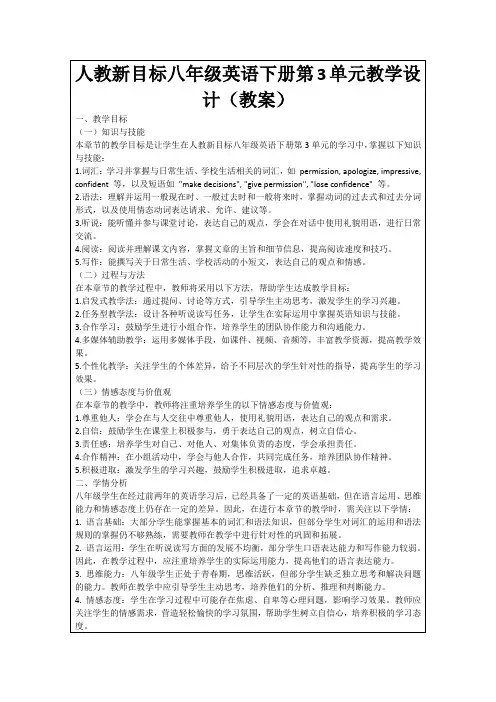
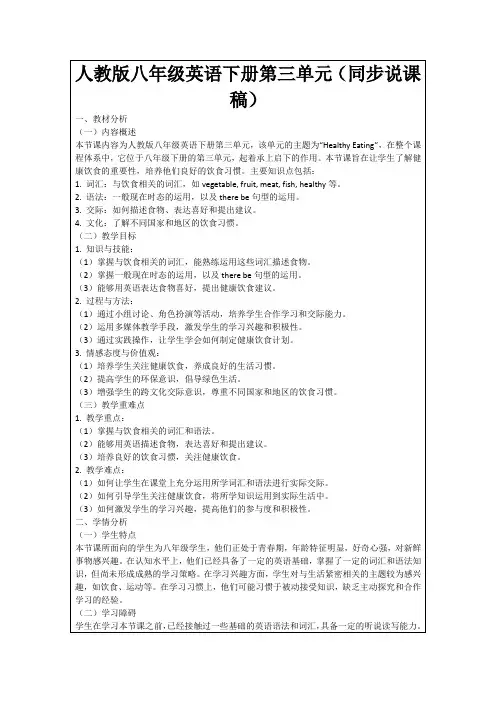
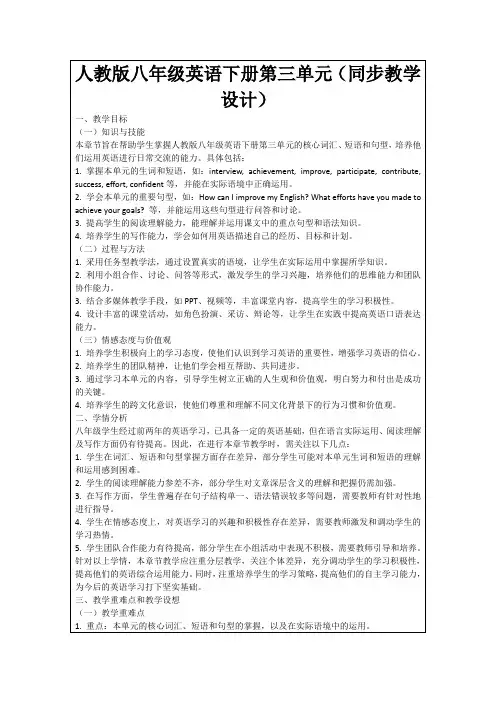
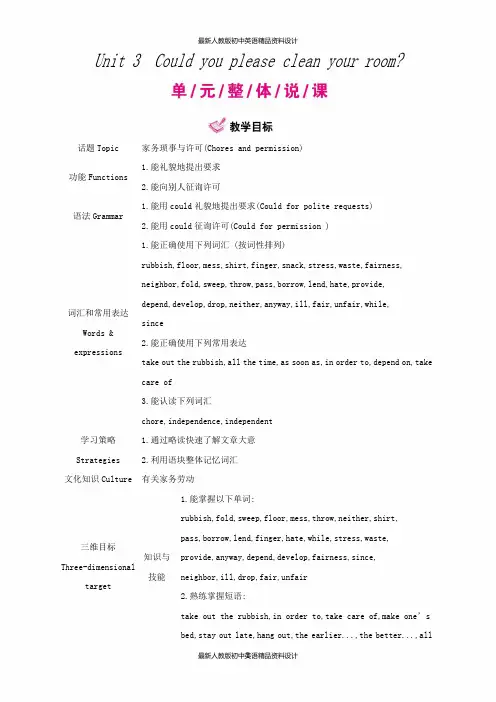
Unit 3 Could you please clean your room?话题Topic 家务琐事与许可(Chores and permission)功能Functions1.能礼貌地提出要求2.能向别人征询许可语法Grammar1.能用could礼貌地提出要求(Could for polite requests)2.能用could征询许可(Could for permission )词汇和常用表达Words & expressions 1.能正确使用下列词汇 (按词性排列)rubbish,floor,mess,shirt,finger,snack,stress,waste,fairness, neighbor,fold,sweep,throw,pass,borrow,lend,hate,provide,depend,develop,drop,neither,anyway,ill,fair,unfair,while,since2.能正确使用下列常用表达take out the rubbish,all the time,as soon as,in order to,depend on,take care of3.能认读下列词汇chore,independence,independent学习策略Strategies 1.通过略读快速了解文章大意2.利用语块整体记忆词汇文化知识Culture 有关家务劳动三维目标Three-dimensionaltarget 知识与技能1.能掌握以下单词:rubbish,fold,sweep,floor,mess,throw,neither,shirt,pass,borrow,lend,finger,hate,while,stress,waste,provide,anyway,depend,develop,fairness,since,neighbor,ill,drop,fair,unfair2.熟练掌握短语:take out the rubbish,in order to,take care of,make one’sbed,stay out late,hang out,the earlier...,thebetter...,allthe time,depend on,as soon as,do the dishes,get a ride,comeover,be angry with,in surprise3.能掌握以下句型:Could you please do sth.?I have to do some work.Could I do sth.?She won’t be happy if she sees this mess.For one week,she did not do any housework and neither did I.My mom came over as soon as I sat down in front of the TV.主语+hate+(to do/doing) sth.4.学会用could 礼貌地请求和征求许可。
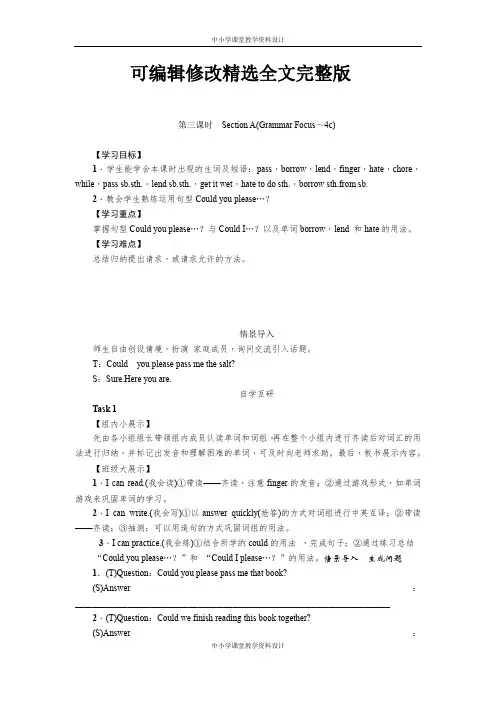
可编辑修改精选全文完整版第三课时Section A(Grammar Focus~4c)【学习目标】1.学生能学会本课时出现的生词及短语:pass,borrow,lend,finger,hate,chore,while,pass sb.sth.,lend sb.sth.,get it wet,hate to do sth.,borrow sth.from sb.2.教会学生熟练运用句型Could you please…?【学习重点】掌握句型Could you please…?与Could I…?以及单词borrow,lend 和hate的用法。
【学习难点】总结归纳提出请求,或请求允许的方法。
情景导入师生自由创设情境,扮演家庭成员,询问交流引入话题。
T:Could you please pass me the salt?S:Sure.Here you are.自学互研Task 1【组内小展示】先由各小组组长带领组内成员认读单词和词组,再在整个小组内进行齐读后对词汇的用法进行归纳,并标记出发音和理解困难的单词,可及时向老师求助。
最后,板书展示内容。
【班级大展示】1.I can read.(我会读)①带读——齐读,注意finger的发音;②通过游戏形式,如单词游戏来巩固单词的学习。
2.I can write.(我会写)①以answer quickly(抢答)的方式对词组进行中英互译;②带读——齐读;③抽测:可以用造句的方式巩固词组的用法。
3.I can practice.(我会练)①结合所学的could的用法,完成句子;②通过练习总结“Could you please…?”和“Could I please…?”的用法。
情景导入生成问题1.(T)Question:Could you please pass me that book?(S)Answer:________________________________________________________________________ 2.(T)Question:Could we finish reading this book together?(S)Answer:________________________________________________________________________自学互研生成能力Task 1Let's read the new words and phrases.1.I can read.(我会读)pass,borrow,lend,finger,hate,while,chore2.I can write.(我会写)(1)pass me the salt 递给我盐(2)come back too late 回来太晚(3)hate to do sth.讨厌做某事(4)finish reading 读完(5)hang out with my friends 与朋友闲逛(6)try(not)to do sth.尽量(不)做某事(7)get it wet 让它打湿(8)lend me some money借给我一些钱3.I can practice.(我会练)根据汉语意思完成下列句子,每空一词。
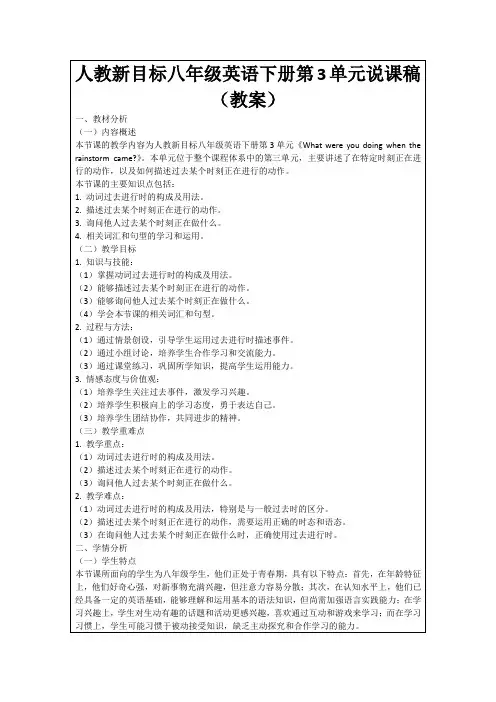
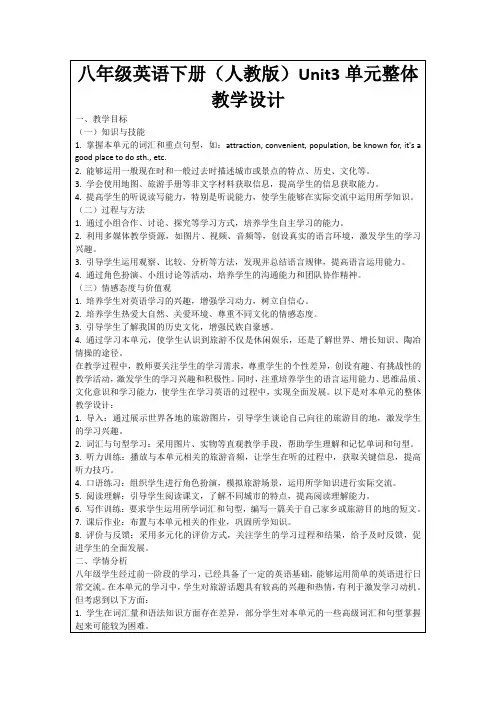
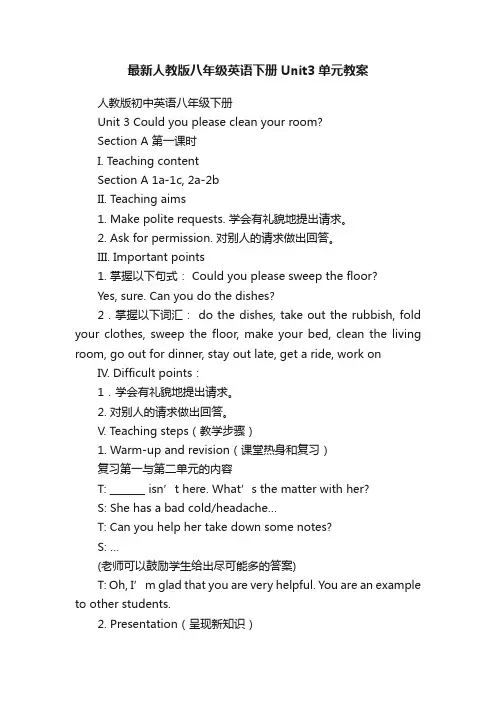
最新人教版八年级英语下册Unit3单元教案人教版初中英语八年级下册Unit 3 Could you please clean your room?Section A 第一课时I. Teaching contentSection A 1a-1c, 2a-2bII. Teaching aims1. Make polite requests. 学会有礼貌地提出请求。
2. Ask for permission. 对别人的请求做出回答。
III. Important points1. 掌握以下句式: Could you please sweep the floor?Yes, sure. Can you do the dishes?2.掌握以下词汇: do the dishes, take out the rubbish, fold your clothes, sweep the floor, make your bed, clean the living room, go out for dinner, stay out late, get a ride, work on IV. Difficult points:1.学会有礼貌地提出请求。
2. 对别人的请求做出回答。
V. Teaching steps(教学步骤)1. Warm-up and revision(课堂热身和复习)复习第一与第二单元的内容T: _______ isn’t here. What’s the matter with her?S: She has a bad cold/headache…T: Can you help her take down some notes?S: …(老师可以鼓励学生给出尽可能多的答案)T: Oh, I’m glad that you are very helpful. You are an example to other students.2. Presentation(呈现新知识)T: What do you usually do on weekends except playing computer games? Do you often help your parents do some chores?S1: …T: Oh, you often do chores on weekends. What chores do you do on weekends? (教师在重复时应用夸张的语调来强调chores这一单词,并把chores写到黑板上,然后用图片帮助同学回答出 ) S2: … do the dishes… take out the rubbish… fold the clothes… sweep th e floor… make the bed… clean the living room3. Work on 1a1)T: Do you do these chores at home? Discuss them with your partner.1. do the dishes2. take out the rubbish3. fold your clothes4. sweep the floor5. make your bed6. clean the living room(让学生讲他们在家做的家务情况,听他们讲英语的情况)2)T: Look at the picture in 1a. Peter and his mother are talking at home. Peter’s mother wants his son to take out the rubbish. Please look at the dialogue. And read it out with your partner.S1: Peter, could you please take out the rubbish?S2: Sure, Mom.(教师可以四处走动,以帮助学生改正错误,特别是take outthe rubbish 这一词组)3)T: What will your mother say if she wants you to do the chores? (用图片进行教学)T: Could you please make the bed?S1: Yes, sure.(Continue with the rest of the pictures.)4. Work on 1b1)T: Now you’ll hear a conversation. Who will do these chores? Check Peter’s mother or Peter.(教师放录音,因为对话简单教师可以在放完一遍录音以后就订正答案)T: Listen again and try to remember the dialogue. And fill in the blanks. (教师投影这页幻灯片。
课题:Unit3 Could you please clean your room? Section A(1a2d)课型:新授课总第课时设计者:使用时间:【问题导学】主问题2. .Listening Practice(1)听两遍录音,完成2a~2b中的任务。
(2)利用2a和2b的信息进行对话练习,完成2c。
【学生自学】学生认真听,自主完成教材问题。
【组内互学】1.交流答案及想法,形成统一的意见。
2.利用2a、2b的信息分角色进行对话练习。
【班内展学】以小组为单位进行汇报,邀请23组同学展示。
其他小组认真听,并进行补充和质疑。
【反馈评价】通过听和说的训练,让学生灵活运用“Could I please…?”句型来委婉征求别人的许可, 及回答语“Sure./ Certainly./ Yes,you can .”“Sorry, I have to/am going to do…”。
主问题2预设答案:学习活动三完成教材2d的任务。
【问题导学】主问题3你知道英语中怎样请求得到对方的许可吗?I翻译下列短语。
1. 外出就餐 ________2. 去看电影 ____________________3. 在外呆得晚 _________4. 搭便车_________________5. 从事,忙于 __________6. 需要去做某事_________________7. 不得不去某事 ________ 8. 使用某人的电脑_________________II请和你的搭档操练下列对话12Conversation 1A: Could I use your puter ?B: Sorry, you can’t . I’m going to work on it now .A: Well, could I watch TV?课题:Unit3 Could you please clean your room? SectionA (3a4c)课型:新授课总第课时设计者:使用时间:When and Where did the story happen (发生)?②What did Nancy’s mom request Nancy to do when Nancy just arrived home from school?③Did Nancy agree to do that?④Why wouldn’t Nancy like to take the dog for a walk?⑤Why was Nancy’s mom angry with Nancy? (主干问题)⑥How did Nancy solve the problem at last ?⑦Do you have the same problems as Nancy at home ?⑧How should you solve the problems between you and your parents?在理解阅读材料时,我们首先把文章的______(主干/支干)问题找出来,这个问题就相当于鱼的脊梁。
新人教版八年级英语(yīnɡ yǔ)下册Unit3 Could you please clean your room ?Section A (1a—2c)教案(jiào àn) Teaching Aims :1.Knowledge Objects :(1).Master the key words and phrases:rubbish, take out the rubbish, fold, sweep, floor, mess.(2).Target language :—Could you please ...?—Yes, sure. /All right. /No problem./Certainly/Of course.Sorry, I can't. I have to do...Sorry, I can't. I am doing...—Could I ...?—Yes, you can. /Sorry, you can’t.2.Ability Objects :(1).Learn to make a polite request and ask for permissions.(2).Be able to understand the dialouges about making a polite request and asking for permissions.3.Moral Objects :(1).Lead the students to know that it’s always right to be polite.(2).Chores are part of fun in our life.Teaching Key Points :1.Master the new words and expressions.2.How to make a polite request and ask for permissions.Teaching Difficult Points :Be able to make polite requests and ask for permissions.Teaching Aids :A tape recorder, A projector.Teaching Procedures :Step 1 Lead-inGreet the class ang listen a song“我爱我家(wǒ jiā)”.(Show some pictures about home in the projector.)Ask some questions:Eg: Do you like your family ? Do you like your father ? Do you like your mother ? Who is the busiest at your home? Why is your house clean? Step 2 Presentation1.Introduction and new words learning.T: Your mothers are always busy, beacuse there are many chores at home. (Learn chore.) For example : do the dishes, take out the rubbish, fold the clothes, sweep the floor, make the bed, clean the living room.Next teach the new words and phrases by using the pictures in the projector.Then ask students “ what other chores do you know?”2.Guessing game. What is she doing ?3.Pair work. Do you do these things at home? Write “Y” for “yes” and “N” for “no”.4.The key sentence introduction.T: If you want Peter to do the dishes, what should you say ? “Peter, do the dishes.”“Can you do the dishes ?”“Could you please do the dishes ?” Which sentence is the most polite ?Ss :Could you please do the dishes ?T: Here, could is not the past tense. Using could is more polite.—Could you please ...?Yes, sure. /All right. /No problem./Certainly/Of course.Sorry, I can't. I have to do...Sorry, I can't. I am doing...Step 3 Teaching activitiesActivity 1 Group work.Welcome to my room ! But this is a dirty room. How to make the room clean? Division of labor within the group.The fastest group is the winner. The key sentence:—Could you please ...?Yes, sure. /All right. /No problem./Certainly/Of course.Sorry, I can't. I have to do...Sorry, I can't. I am doing...Activity 2 Listening.1.Review the chores. Then listen to the tape, who will do these chores?Check (√)Peter’s mother or Peter.2.Listen again, finish the blanks.3.Role play the tapescript. The boys PK the girls.Activity 3 Interview .Who is the most able at home?1. What chores do you do at home? How often do you do the chores? Work in group.2. Then one student make a report to the class. “In my group,…. does the dishes every day,…We think … is the most able one in our group.”3.The awards.Give the awards to the most able student in each group.Step 4 Summary1. New vocabularydo the dishes, sweep the floor, take out the trash, make the bed, fold the clothes, clean the room2. —Could you please ...?—Yes, sure. /All right. /No problem./Certainly/Of course.Sorry, I can't. I have to do...Sorry, I can't. I am doing....Step5 Homework1.Conversation practice:Make a conversation between you and your parent about doing the chores. Remember to use the sentences we learnt today.2.Review and remember the new words.【Blackboard Design】Unit 3 Could you please clean your room?Section A 1a—1cLove our parents! Help do the chores!内容总结(1)新人教版八年级英语下册Unit3 Could you please clean your room (2)We think。
八年级下册英语第三单元教案1一、教学目标1. 知识与技能目标- 学生能够掌握本单元的重点词汇,如“housework”“sweep”“fold”等,并能正确运用这些词汇进行表达。
- 学生能够理解并掌握本单元的语法结构,如“Could you please...?”“Yes, sure. / Sorry, I can't. I have to...”等句型,并能在实际情境中熟练运用。
- 学生能够进行流利的口语表达和书面表达,能够用英语描述日常生活中的家务活动以及自己的日常安排。
2. 过程与方法目标- 通过英语单词接龙游戏和英语短剧表演等活动,培养学生的合作学习能力和竞争意识。
- 通过课堂讨论和小组活动,培养学生的思维能力和创新意识。
- 通过写作练习,培养学生的书面表达能力和自我反思能力。
3. 情感态度与价值观目标- 培养学生自主学习英语的习惯,激发学生学习英语的兴趣。
- 让学生了解家务劳动的重要性,培养学生的责任感和家庭观念。
- 鼓励学生积极运用英语进行交流,提高学生的跨文化交际能力。
二、教学重点与难点1. 教学重点- 掌握本单元的重点词汇和语法结构。
- 能够进行流利的口语表达和书面表达。
- 培养学生自主学习英语的习惯。
2. 教学难点- 如何让学生在实际情境中熟练运用本单元的语法结构进行表达。
- 如何提高学生的书面表达能力和跨文化交际能力。
三、教学方法1. 情景教学法:通过创设真实的生活情景,让学生在情景中学习英语,提高学生的语言运用能力。
2. 任务驱动法:通过布置各种任务,让学生在完成任务的过程中学习英语,提高学生的学习积极性和主动性。
3. 合作学习法:通过小组合作学习,让学生在合作中学习英语,提高学生的合作学习能力和竞争意识。
4. 游戏教学法:通过英语单词接龙游戏和英语短剧表演等活动,让学生在游戏中学习英语,提高学生的学习兴趣和学习效果。
四、教学过程1. 导入(5 分钟)- 教师通过播放一段关于家务劳动的视频,引出本单元的主题“Housework”。
Unit 3 Could you please clean your room?教材解读本单元的话题是Chores,主要是关于家庭生活,谈论家务琐事及家庭互助,要求学生学会用Could you please ...?和Could I please ...?来委婉地提出请求或征求别人的许可以及如何有礼貌地拒绝别人并表达自己的理由,陈述自己的好恶。
家庭生活及家务劳动是社会家庭和学生生活中的重要方面,对学生生活习惯的养成、社会行为习惯及家庭责任感的建立起着重要的作用。
通过学习本单元,学生应当能认识到家庭亲情及家庭义务的重要性,应对参加及帮助父母做适当的家务持有积极的态度。
通过单元学习,学生还将了解中西方在这方面的文化差异,增强他们在日常生活中的沟通和交流能力。
单元目标一、知识与技能1. 掌握重点单词和短语。
2. 掌握请求帮助和请求允许及应答的句型:Could you please clean your room? CouldI please use the car? Yes,you can. No,you can’t. I have to go out.3. 培养听说读写四项基本技能。
二、过程与方法采用个人独立思考,两人或多人小组合作、交流的学习策略,积极创设较真实的语言环境,利用教学图片、录音机或多媒体课件来展开课堂的听力和口语交际活动。
三、情感态度与价值观明确“家务人人有责”的思想,能积极主动地参加家务劳动。
认识到父母照顾家庭的辛劳,养成爱父母、爱家庭、爱家务的好习惯。
学习照顾家庭同时也是照顾自己,培养独立能力,为自己的将来奠定基础。
教法导航采用直观教学法,遵循以学生为主体的原则。
学法导航采用Using contest guessing和Role playing的学习策略,课时支配第1课时:Section A 1a-2d第2课时:Section A 3a-4c第3课时:Section B 1a-2e第4课时:Section B 3a-Self Check精品文档课时教案第1课时Section A 1a-2c教学目标一、知识与技能1. 掌握重点词汇和短语:do the dishes,take out the rubbish,fold your clothes,sweep the floor,make your bed,clean the living room2. 理解并掌握重点句型:Could you please…? Could I …?3. 能听懂有关做家务和日常活动的对话。
二、过程与方法采用情境教学法,调动学生的积极性,引导他们积极参与课堂。
三、情感态度与价值观了解各种家务,能发现要做的家务并积极主动地去做。
教学重点能用本课的重点词汇和句型对家务作出委婉请求。
教学难点能抓住录音中的关键词。
教法导航课上引导学生积极参与课堂活动,老师少讲,鼓励学生多练。
学法导航加强小组合作学习,积极回答问题。
教学准备图片,录音机,多媒体。
教学过程Step 1 GreetingsGreet the students as usual.Step 2 Lead-inT:Good morning,boys and girls! I am always very busy on weekends. So my daughter often helps me with the housework. Do you often help your mother do the chores at home? (Write “chores” on blackboard and explain it.) Here “chore” means housework. Could you please tell me what chores you do at home?S1:I often clean my room.精品文档S2:I wash my clothes and fold my clothes.S3:I clean the window.S4:I make my bed and sweep the floor.S5:I clean the living room.T:Well,you are good boys and girls! We should try to be helpful and do some chores at home.Step 3 New words and expressionsAsk the students to look at the picture on Page 17.T:Look at the picture on page 17. What can you see?S1:Peter and his mother.S2:The dustbin is full.S3:The floor is dirty.S4:...T:So there are a lot of chores to do,right? Help students to learn the following phrases about chores:clean the living room; do the dishes; sweep the floor; make the bed; take out the trash; fold the clothesStep 4 PresentationT:If you want to ask somebody to do chores,how can you ask in English?S1:Can you do the chores?S2:Could you please do the chores?T:Which one do you think is better?students:The second one.T:Yes. We should say“Could you please do the chores?”instead of other ways because it sounds very polite. Write “Could you please ...?” on the blackboard.Step 5 Pair workT:In the picture,the mom asks the son to do some chores. What does she say?S:Peter,could you please take out the trash?T:Good! Today,we’ll learn how to make polite requests with could. It is very important to be polite in our life. Now work in pairs. Imagine you are the mom and the son in the picture. Ask your partner to do the chores that you see.First ask two students to read the sample conversation in activity 1c. Then students make their own conversations. Call several pairs to demonstrate their conversations to the class.Step 6 ListeningT:You will here a conversation between Peter and his mother. What kind of chores do Mom and Peter do? Check Mom or Peter.Play the recording twice. For the first time students focus on the chores Mom does; the second time,focus on the chores Peter does. Then check the answers.Step 7 A little gameFind out the best helper at home.精品文档T:Do you often help your parents do the chores? Now let’s choose the best helper at home. First please write down all the chores from your memory on a piece of paper. Then check each chore you do at home. The one who check the most chores will be the best helper at home.Step 8 Group workT:Imagine we are going to clean our classroom this afternoon. You need someone to help you do some things. Think of the things you need to do and make polite requests to your partners. You may find these phrases useful.Show the following phrases on the screen:carry some water,clean the desks,clean the chairs,clean the windows,clean the blackboard,turn off the lights,take down the old pictures,put up the new pictures,sweep the floor. After a few minutes,call several groups to show their conversations.Step 9 PresentationT:I can’t find my pen. But I have to write something now. What can I do?S:You can borrow a pen from others.T:But what should I say?S:Can I use your pen?T:But that doesn’t sound ve ry polite. Any other idea?S:Could I please use your pen? (Write the sentence on the blackboard)T:Good! That’s a very polite way.Step 10 ListeningAsk the students to look at the picture on Page 18. Then say:Look at the picture. That’s Peter and his father. Peter asks his father if he can do four things. Look at the chart in activity 2a. What are the four things? Ask a student to read the things aloud.T:What does his father say? Now please listen to the tape and check ‘yes’ or ‘no’ in the chart. Play the tape twice. For the first time,they only listen. The second time,they check “yes” or “no”. Then check the answers with the whole class.T:Why Peter’s father say no? What are his reasons? Let’s listen to the conversation again. Draw lines to the reasons in the chart. Before play the tape,ask a student to read the reasons given. Then play the tape. If necessary,play it again. Check the answers.Help students to summarize different ways of answering the question “Could I...?”Yes,you can / I guess so / Oh,yeah / Sure. No,you can’t. ... / Sorry,but ...Step 11 Pair workT:Now look at activity 2c. Work in pairs. Student A is Peter who asks if he can do things. Student B is Peter’s father who says “yes” or “no”. If you say “no”,give a reason.First get two students to read the sample conversation. Then students make their own conversations.Step 12 Group workT:Imagine we’ll have a self-study class this afternoon. You would like to do many 精品文档different things. How will you ask your teacher for permission? Please do it in groups of four. One will be the teacher,and the others will be the students,make conversation like this:S:Could I please listen to music?T:No you can’t.S:Could I please go to play basketball?T:Sorry,you have to stay in class.S:Could I please draw pictures?T:Yes,you can.After that,get several groups to demonstrate their conversations to the class.Step 13 Homework1. Suppose you are having a party,and you need more drinks and snacks. But you can’t leave the house. Ask your classmates for help. Write a dialogue between you and your classmate with “Could I please ...?”and “Could you please ...?”2. Understand,read and role play the conversation in 2d.课堂作业1. ---Could you please s the floor?---Yes,sure.2. ---Could you please do the d ?---Sorry,I can’t. I have to do my homework.3. 我每天早上都整理床铺。